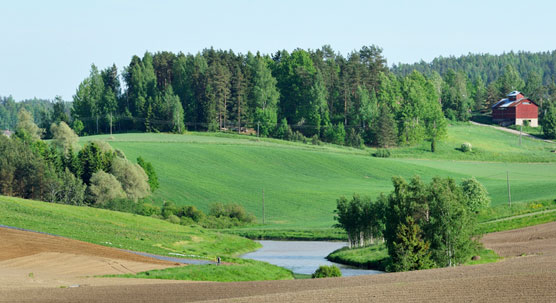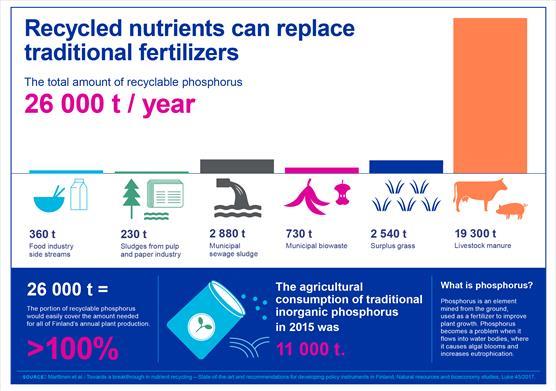Press release 2017-10-20 at 12:12
by Natural Resources Institute Finland (Luke), Finnish Environment Institute (SYKE), VTT Technical Research Centre of Finland, Finnish Food Safety Authority Evira

Finnish countryside © Martina Motzbäuchel
According to a recent Finnish study, more efficient utilisation of nutrients requires a policy reform. Normative guidance should better support the processing of organic side streams, such as manure, into recycled fertiliser products. Nutrient recycling is part of the EU's circular economy goals.
To improve the efficiency of recycling, Finnish researchers specialised in natural resources and environment propose that policies governing the use of nutrients would be reformed. This reform would define a single statute covering all types of fertilisation by developing, for example, the nitrate decree. Furthermore, it is proposed that the EU agri-environmental scheme in Finland in its current form should be abandoned. However, the problem is global, and many decisions related to the field are made at the EU level.

Click the picture to open up a bigger version of it.
“The goal of normative guidance should be to use nutrients according to the needs of plants, and regulation should support the replacement of conventional inorganic fertilisers with recycled nutrients. Regulation must be simple and appropriate, both within the EU and at national level. In order to improve nutrient recycling, information systems must also be developed”, Sanna Marttinen, Secretary General of the Finnish Partnership for Research on Natural Resources and the Environment (LYNET) summarises the researchers’ proposals.
Circular economy requires action
Efficient nutrient recycling plays an important role in the EU goal of transforming the economy into a circular one. The world’s mineral phosphorus sources are finite, and EU countries are heavily dependent on imported phosphorus. Disrupted nutrient cycling due to geographical segregation of crop and livestock farms is causing local and regional accumulation of nutrients in many European countries.
“Recycling phosphorus and nitrogen is important to promote water protection, food security and circular economy. However, currently nutrients are not being recycled efficiently enough to reach the set goals”, says Marttinen.
In Finland, manure from domestic animals alone contains so much phosphorus that, if utilised efficiently, it could cover the phosphorus demand of cultivated plants in the whole of Finland. However, thousands of tonnes of inorganic fertilisers are used every year.
Various benefits
Finland is committed to becoming a model country in nutrient recycling in the Baltic Sea region. The current Government is seeking to increase the processing of organic side streams. Processing enables cost-effective transportation of nutrients to areas where they are needed. In addition, processing may be used to improve nutrient availability for plants.
Currently, 5 per cent of all manure is processed in Finland, while the actual need is at least 20 per cent. The situation is fairly similar in Belgium and the Netherlands, for example. Solving these problems within the EU would create new business opportunities for competitive clean technologies for domestic markets and exports.
“Incentives for creating concepts for products and services over the entire nutrient cycle should be made. A functioning market for recycled nutrients would effectively balance supply and demand. The soon-to-be-reformed EU fertiliser legislation will offer opportunities, but is not a sufficient measure on its own”, Marttinen says.
The results of the Finnish study are summarised in a Policy Brief. In addition to clarifying goals and policies, the researchers propose that the knowledge base that drives all decision-making would be strengthened.
Further information
Luke Policy Brief:
Nutrient recycling – from vision to practice (.pdf)
Sanna Marttinen, Secretary General, The Finnish Partnership for Research on Natural Resources and the Environment (LYNET), firstname.lastname@luke.fi, tel. +358 295 326 356
Infographics:
The report Towards a breakthrough in nutrient recycling – State-of-the-art and recommendations for developing policy instruments in Finland was compiled by a group of experts working at Natural Resources Institute Finland (Luke) Finnish Environment Institute (SYKE), VTT Technical Research Centre of Finland and Finnish Food Safety Authority Evira. The report was assigned by the Finnish Ministry of the Environment and Ministry of Agriculture and Forestry. The report is currently available only in Finnish.
Background information:
- Accumulation of nutrients presents a remarkable problem in the EU
- Recycled fertiliser products play an important role in meeting EU’s goals for nutrient circulation
- Reformation of steering mechanisms is needed to accelerate the use of recycled nutrients
- Functioning markets of recycled nutrients create new business opportunities for European cleantech companies